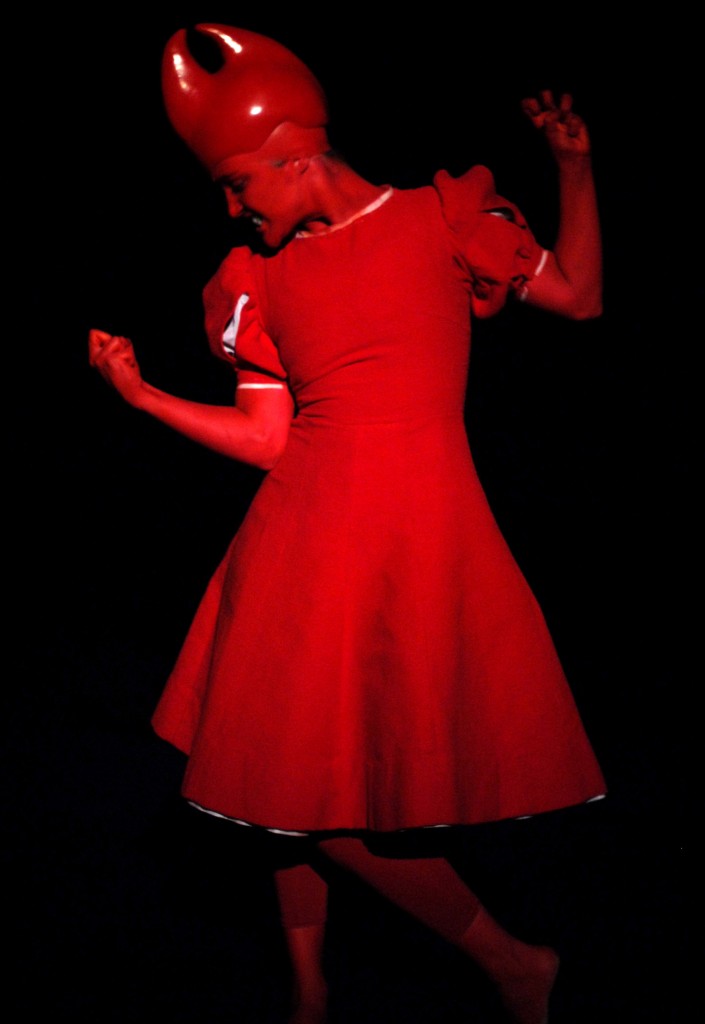Had a fun ‘phone chat the other day with several members of Dewey Dell. The brash young Italian movement troupe has been at Wesleyan University in Middletown for the past week leading student workshops and performing the U.S. premieres of two of their distinctively colorful, kinetic and techno-pulsed movement theater pieces. The 20-minute two-character work a elle vide was performed last weekend, while the grander Cinquanta Urlanti Quaranta Ruggenti Sessanta Stridenti—the title has been translated as Furious Fifties, Roaring Forties, Shrieking Sixties—will be done TONIGHT (Friday, Sept. 16) at 8 p.m. in Wesleyan’s CFA Theater.
The company members are still college-age themselves. Dewey Dell formed just four years ago out of a school project, and one of the troupe’s goals at Wesleyan is to use the students in their workshops to begin devising larger ensemble works.
Here’s a 13-minute YouTube excerpt from Cinquanta Urlanti Quaranta Ruggenti Sessanta Stridenti:
Three of the four founders of Dewey Dell—Agata, Demetrio and Teodora Castellucci—are siblings, offspring of the renowned Italian director Romeo Castellucci, known here in Connecticut for the mindblowing, inner-throat examining adaptation of Shakespeare’s Julius Caesar which Castellucci’s Societas Raffaello Sanzio company brought to the Stamford Center for the Arts as part of the International Festival of Arts & Ideas in 2000. That Julius Caesar was one of the intellectually hippest art events happening that summer (I remember meeting Susan Sontag in the lobby), just as Dewey Dell’s appearance—the first U.S. appearance of a company that’s barely toured—is a real coup for Wesleyan.
While the troupe wants to maintain their independence from Castellucci and his work, there are strong connections. The Societas Raffaello Sanzio runs a school, Stoa, based on methods and philosophies about rhythm and movement developed by Claudia Castellucci—Romeo’s sister, the aunt of Teodora, Agata and Demetrio.
Dewey Dell has the precocity and open-minded ensemble sense of a rock band, with the sort of name a smart band might pick. Dewey Dell named themselves for a character in William Faulkner’s novel As I Lay Dying, explains Eugenia Resta, the sole Dewey Dell co-founder not surnamed Castellucci. “We wanted a female name for our company. And everybody had read this novel,” Resta said in halting English.
Touring, Resta says, “wasn’t the first idea. We did a little performance in a school, exposed some little works we prepared during the year.” Their work got noticed and won a choreography award, which led to “a lot of little festivals,” where their shorter, 25-minute pieces could play alongside other acts. Besides the two established works they’ve brought to Wesleyan, Dewey Dell is developing a new piece while on campus. “We decided to work with students from the workshop,” Resta says. We are thinking to continue this work, involving a group of ten people”—Dewey Dell’s grandest work yet.
The company develops its works communally, with attention paid to the sort of space in which they’ll ultimately be performed. According to Demetrio Castellucci, who provides the musical elements, “There isn’t anything that’s first or second in this process. Sometimes I create a musical skeleton, and the [dancers] build on that. Sometimes the percussion is adjusted for the movements. Sometimes the music is first, then at the last minute things change.” The composer—who does ultimately record his score and play it from the sound booth rather than play live—is always asking himself “How will the room sound? In our second work, we were in this neoclassical hall, in front of a very clear space, so I worked on a reverberating sound.” Currently he’s working on “very quiet sounds. The purpose is to make very low sounds that sound like loud sounds coming from a great distance. It’s a dramatic question. I’m very interested in moving the sound into the space.”
Castellucci speaks of creating an “onomatopoeia to movement,” and is fascinated with cultures where music and dance are inextricably linked. “The Swahili word for drum means both dance movement and music. I like how in Africa, music is just a part of the whole.” Demetrio calls Dewey Dell “a very linked union.”
“Working with family, of course, is a very special thing. Some aspects are good, and there are the other sides. It’s good because we don’t need to talk much because we understand what we mean.”

